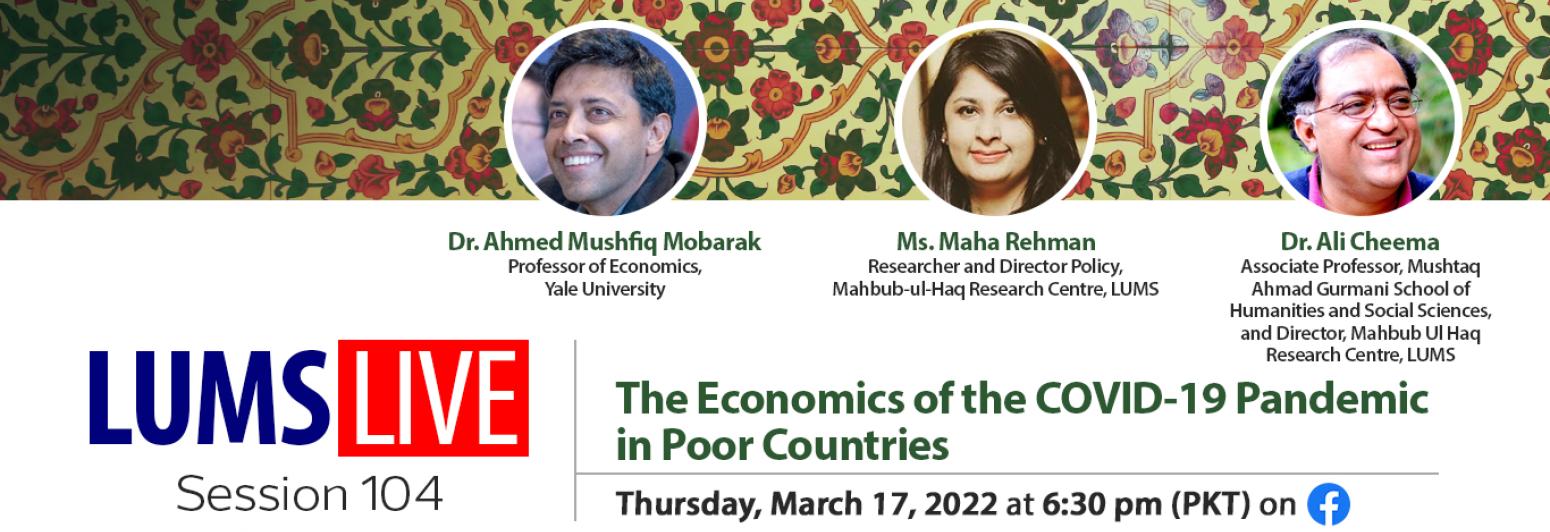
March 17, 2022
The COVID-19 pandemic has upended health and living standards around the world. This discussion will provide an overview of these effects, with a particular focus on low- and middle-income countries (LMICs). Economists have explained how the pandemic is likely to have different consequences for LMICs, and demanded distinct policy responses, compared to rich countries.
The pandemic’s many adverse economic and noneconomic effects in terms of living standards, education, health, and gender equality appear to be unprecedented in scope and scale. This session will also review research on successful and failed policy responses, including the failure to ensure widespread vaccine coverage in many LMICs. Vaccines are changing the course of the COVID-19 pandemic, but in grossly uneven ways. The poorest countries continue to face considerable obstacles in both receiving and distributing doses. To limit virus transmission, its devastating impacts, and opportunities for further mutations, this must change. Until it does, non-pharmaceutical interventions such as masking must remain a priority.
Hosted in collaboration with the Mahbub ul Haq Research Centre (MHRC) as part of their Mahbub Ul Haq Distinguished Lecture Series, the session will be moderated by Ms. Maha Rehman and Dr. Ali Cheema.
About the Panelists
Dr. Ahmed Mushfiq Mobarak
Dr. Mobarak is the founder and faculty director of the Yale Research Initiative on Innovation and Scale (Y-RISE). He holds other appointments at Innovations for Poverty Action, IGC and J-PAL at MIT. He conducts field experiments exploring ways to induce people in developing countries to adopt technologies or behaviors that are likely to be welfare improving. Dr. Mobarak has several ongoing research projects in Bangladesh, Nepal, Pakistan, and Sierra Leone. His research has been published in renowned journals and media outlets around the world. He received a Carnegie Fellowship in 2017. Dr. Mobarak is collaborating with the government of Bangladesh and organisations to devise evidence-based COVID response strategies. He holds a PhD in Economics from the University of Maryland at College Park.
Ms. Maha Rehman
Ms. Rehman, a Data Analytics Expert, has extensive experience in designing and executing evidence-based programs, products and policies to improve service delivery and impact. Previously, with the Centre for Economic Research Pakistan (CERP) Leadership Team, she set up the Analytics Wing at CERP that focused on embedding data in the decisions and operations of private and public sector companies to increase efficiency, impact and profit. Prior to this, she has led research experiments at CERP and at the World Bank in the fields of education, public finance and governance. She has designed curriculum and taught policymakers, bureaucrats and data practitioners at various programs in the USA and Pakistan. Currently, she is teaching at the LUMS Economics Department. Besides using data analytics for policy and programme reform, her research interests include energy economics, education and law & governance. She combines her coursework in economics with her interest in entrepreneurship and is also a Pakistan Acumen Fellow, 2016. She frequently writes for DAWN and other daily publications and blogs. She completed her graduate studies in Economics from Duke University, USA and has an undergraduate degree in Economics and Mathematics from LUMS.
Dr. Ali Cheema
Dr. Cheema is co-lead academic of the LSE-Oxford based International Growth Centre’s Pakistan programme and was a founding member of the 2006 Stockholm Challenge Award-winning portal, Relief Information System for Earthquakes, Pakistan (risepak.com). He is also a Senior Research Fellow at the Institute of Development and Economic Alternatives (IDEAS) Pakistan and co-founder of the Centre for Economic Research in Pakistan (CERP). He is a member of the Board of Trustees of the Institute of Development Studies (IDS), Sussex. His recent work is on governance, public finance, and human capital acquisition, which has published in leading international journals and conferences. A Rhodes Scholar, he holds a BA (Hons) in Politics and Economics from Oxford and a PhD in Economics from Cambridge. He has served as a member of Pakistan’s National Finance Commission and was a visiting Fulbright Scholar at Harvard.



















